Our favourite places to stay on this sleepy Cebu island.
15 Festivals in the Philippines to Anticipate Every Month
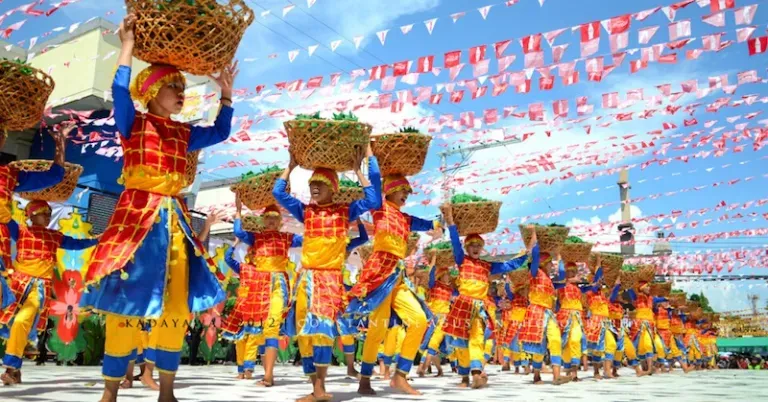
Every month of the year, the different festivals in the Philippines bring a spirit of joy with cheerful dances and colourful feasts. Between the parade floats and banderitas and delicious food, the Filipino fiesta has become a symbol of warmth, generosity, and sense of community. From Luzon to Mindanao, we get to witness the incredible cultural diversity that our country has to offer.
Did you know that fiestas are actually rooted in precolonial culture? Even before the Spaniards brought Catholicism into the country, the Filipino natives would already gather for feasts and give thanks to deities for a bountiful harvest, as noted in the accounts from Antonio Pigafetta, Pedro Chirino, and Miguel de Loarca.
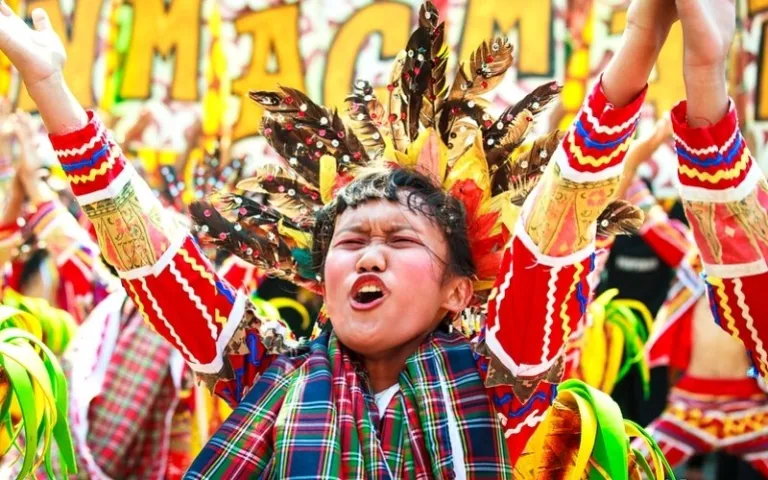
If there’s anything we look forward to every month, it’s joining these festive occasions in the Philippines. Here, we’ve gathered the famous Philippine festivals that you can anticipate in the future!
Also read: COVID-19 Philippines Travel Advisory for Filipinos & Foreign Visitors
Must-see festivals and fiestas in the Philippines
January
1. Sinulog Festival in Cebu
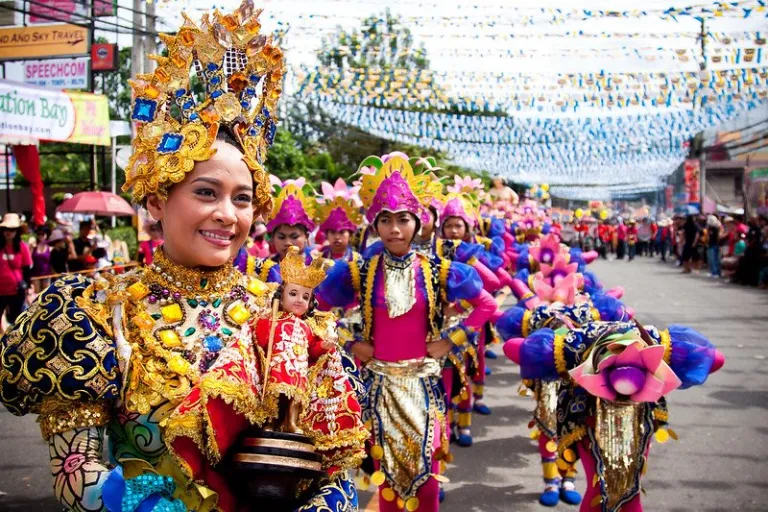
Highly anticipated among festivals in Cebu is the Sinulog Festival, the first of many fiestas celebrating the Sto. Niño. Highlights of this Filipino festival include the Sinulog Grand Parade, a spectacular fireworks show, a Miss Cebu pageant, and a re-enactment of Ferdinand Magellan offering the statue of Sto. Niño to Raja Humabon and Hara Amihan.
Keep an eye out for the Sinulog dance, which mimics the currents of a river through back-and-forth movements. You might also witness participants dancing while moving through the crowd in a snake-like pattern. Needless to say, you can expect plenty of fun-filled experiences at this Filipino fiesta!
When: Third Sunday of January
Also read: First Timer’s Guide to Surviving Cebu’s Sinulog Festival
2. Ati-Atihan Festival in Kalibo, Aklan
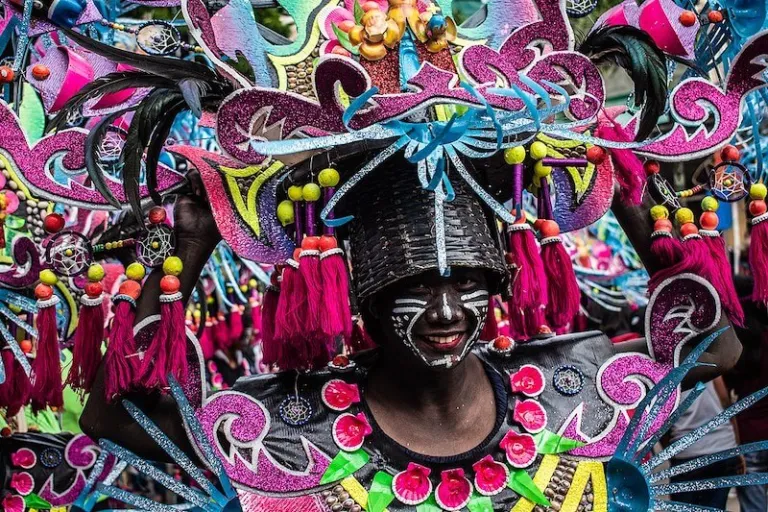
No list of Filipino fiestas would be complete without the Ati-Atihan Festival in Kalibo, Aklan. One of the most popular festivals in the Philippines, this Filipino festival lives up to its name as the “Mother of All Philippine Festivals” through one epic week of tribal dancing, lively street parades, religious processions, and of course, free-flowing drinks!
Originally, the festival traces its origins to the Barter of Panay, where the Aeta people received gifts from Malay chieftains who had escaped Borneo and found refuge on Panay Island in the 13th century. And so, the participants of the Ati-Atihan Festival give honour to the Aeta people by painting their faces ebony.
When: Third week of January
3. Dinagyang Festival in Iloilo
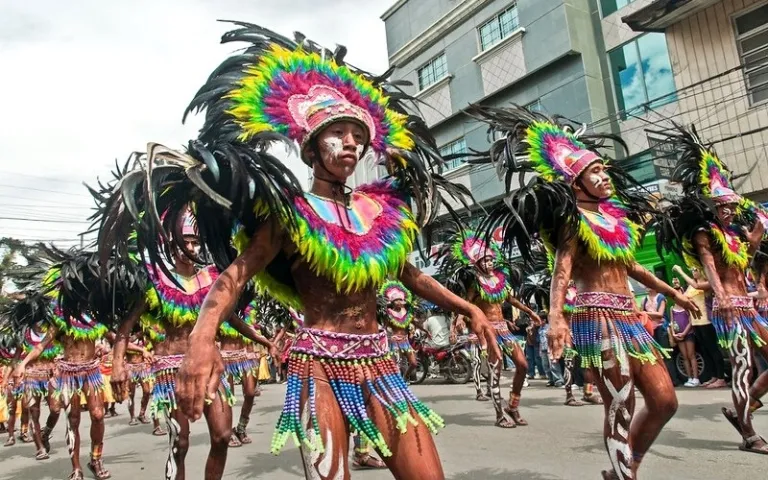
Just like Cebu’s Sinulog and Aklan’s Ati-Atihan, the Dinagyang Festival in Iloilo is a festival that commemorates the feast of Sto. Niño. Held in January, this two-day festival derives its name from “dagyang,” the Hiligaynon word that stands for “merrymaking.”
Established in 1968, Dinagyang began when Father Sulpicio Enderes offered a replica of the Señor Sto. Niño de Cebu to Iloilo City. Now, this festival never fails to attract younger crowds with its colourful and energetic performances, as participants fill the streets with the fanfare of drum beats, street dance competitions, and parties.
When: Fourth Saturday to Sunday of January
February
4. Panagbenga Festival in Baguio
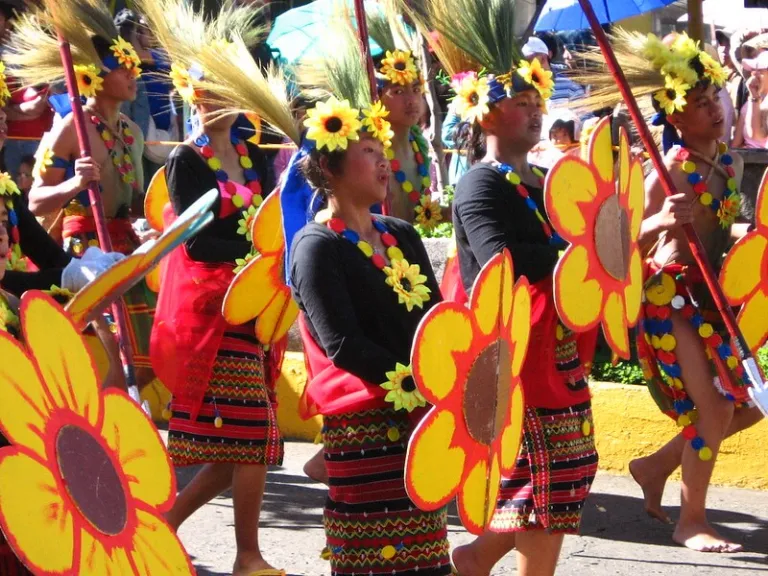
Baguio, the summer capital of the Philippines, turns into a floral wonderland every February, thanks to the Panagbenga Festival. From a Kankanaey word that evokes a “season of blooming,” this annual flower festival in the City of Pines is one of the newer festivals in Luzon.
In 1996, it began as an attempt to lift people’s spirits after a 7.7-magnitude earthquake left the city in rubble. From this wreckage, the Panagbenga Festival was born — spreading joy and hope through a parade of floats with flowers, marching bands, performers in floral-themed costumes, flower expositions, and vendors selling handicrafts.
When: February
5. Philippines International Hot Air Balloon Festival in Clark, Pampanga
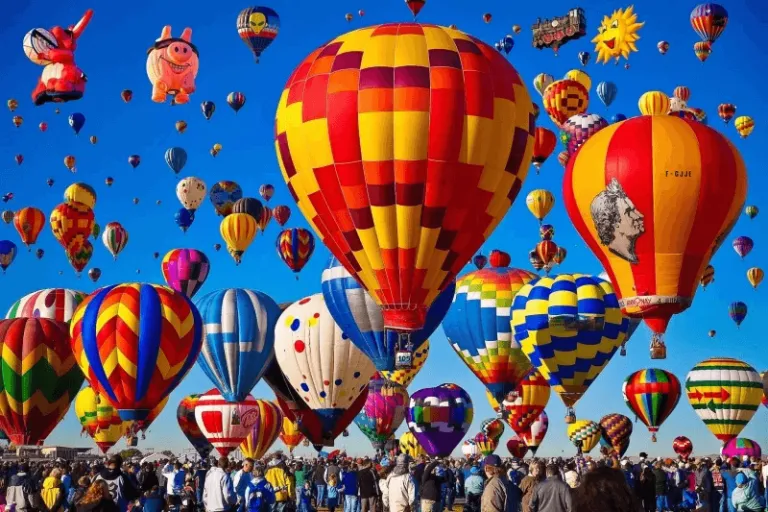
For four beautiful days in Clark, Pampanga, the annual Philippine International Hot Air Balloon Fiesta attracts people with its tagline: “A Weekend of Everything that Flies.”
Initially, the festival organisers came up with a plan to boost the local economy after the catastrophic eruption of Mount Pinatubo in 1994. Today, this non-religious Filipino festival showcases hot air balloons, rocketry demonstrations, freestyle aerobatics, helicopter-flying exhibitions, kite-flying, and other thrilling activities. Currently, this balloon fiesta holds the title of the longest-running aviation sports event in the Philippines, gathering almost 100,000 people each year.
When: Second week of February
Also read: 10 Things to Do in Clark for Your Next Weekend Getaway
March
6. Malasimbo Music & Arts Festival in Puerto Galera, Oriental Mindoro
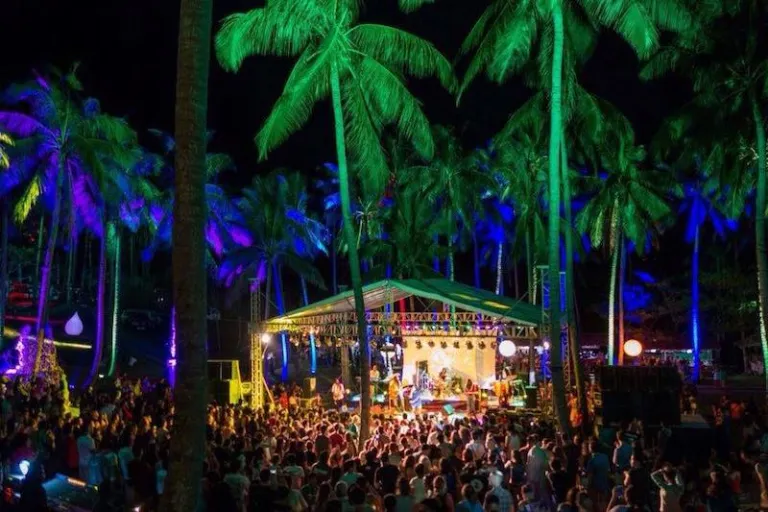
Bringing together the nation’s best musicians and artists in an exciting line-up, the annual Malasimbo Music & Arts Festival is held in Puerto Galera, Oriental Mindoro in March. One of the trendier festivals in the Philippines, this open-air festival promotes four things: music, visual arts, indigenous people, and environmental awareness.
The Malasimbo Music & Arts Festival was named after Mount Malasimbo, whose foothills served as the festival’s original venue: a natural amphitheatre surrounded by palm trees. Besides promoting up-and-coming artists, the festival also highlights the craftsmanship of Mindoro’s indigenous people, helping the Mangyans preserve their cultural heritage.
When: First week of March
April
7. Moriones Festival in Marinduque
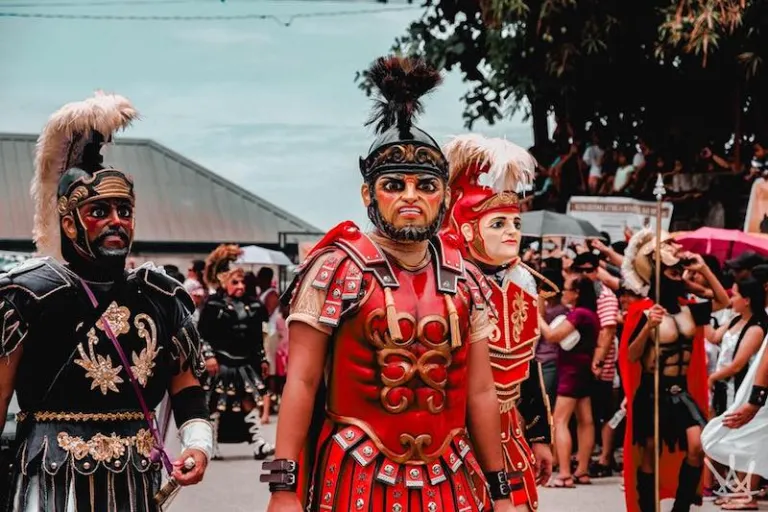
Set on the island of Marinduque, the Moriones Festival is a week-long festival that takes place during Holy Week. Over seven days, the festival participants dramatise the story of Longinus, a half-blind centurion who pierced the side of Jesus Christ. When Christ’s blood landed on Longinus’ blind eye, his sight was miraculously restored. During the festival, the penitents of Marinduque wear masks and elaborate costumes inspired by the Roman soldiers to commemorate this biblical story.
When: Holy Week
May
8. Pahiyas Festival in Lucban, Quezon
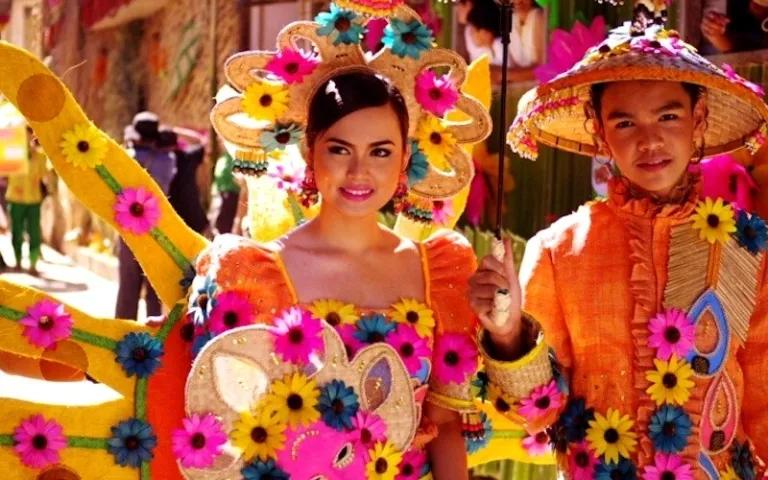
May is the most colourful month of the year for fiestas in the Philippines! And if you’re looking for Filipino festivals in Luzon, you can’t go wrong with this one. Famously called the “fiesta to end all fiestas,” the Pahiyas Festival sees the townspeople of Lucban in the province of Quezon adorn their houses with fruits, vegetables, rice, hats, and kiping — thin and colourful rice wafers that are shaped like leaves, which can be grilled or fried. Afterwards, one of these houses wins a prize.
This tradition started in the 1600s, mainly as a way for Filipino farmers to give thanks for a bountiful harvest. Therefore, the harvest festival is held every year on the 15th of May. It also happens to be the feast day of San Isidro Labrador, the patron saint of farmers in the Philippines.
When: 15 May
June
9. Pintados-Kasadyaan Festival in Tacloban, Leyte
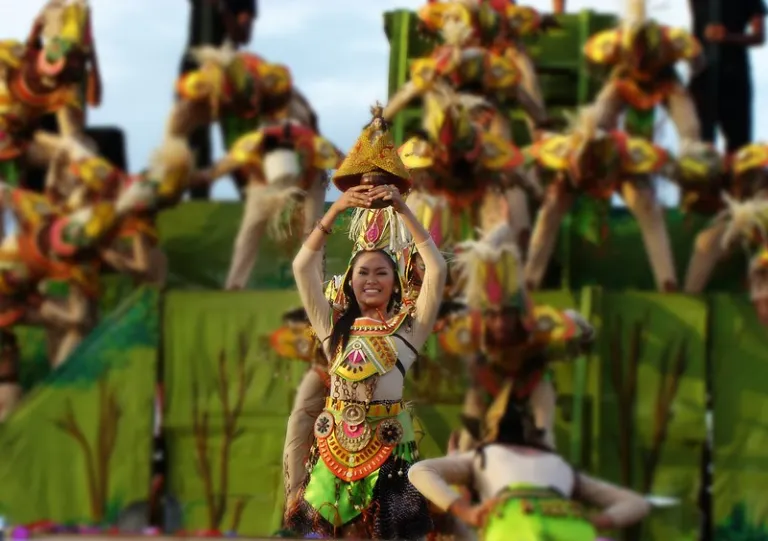
One of the most prominent festivals in Eastern Visayas is the Pintados-Kasadyaan Festival in Tacloban City, Leyte. The Pintados Festival is merged with the Kasadyaan Festival, which takes place on 29 Jun. Together, this Philippine fiesta brings together several municipalities in colourful parades, beauty pageants, and festival dances.
One of the highlights of this fiesta is the dancing on the streets, where the participants wear beautiful costumes and paint their bodies in eye-catching designs. In doing so, they take pride in the tradition of body-painting among the indigenous people of Samar and Leyte, whom the Spaniards referred to as pintados or “painted ones.”
When: Last week of June
July
10. T’nalak Festival in Koronadal, South Cotabato
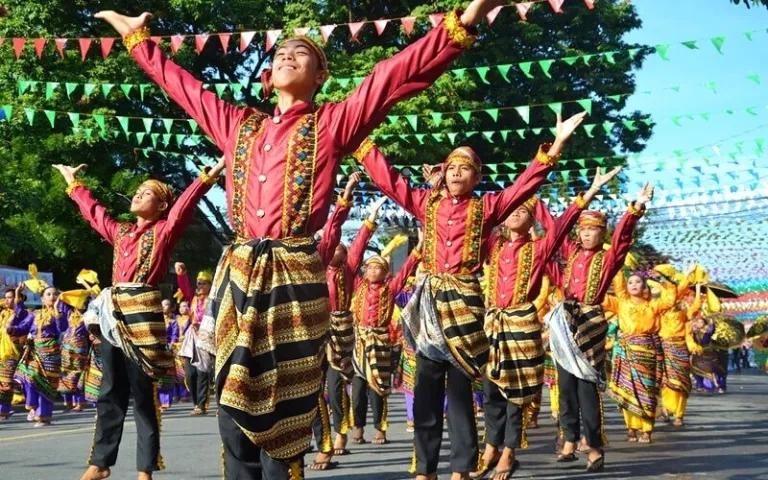
Every July in Koronadal City, the T’nalak Festival happens simultaneously with the foundation day of South Cotabato province. This week-long festival in the Philippines comes with a grand parade that showcases the different cultures of the tribal communities in South Cotabato, such as the B’laan and T’boli. Furthermore, you can expect themed competitions and street performances that weave in traditional stories through dance.
Named one of the most vibrant festivals in Mindanao, this festival gets its name from t’nalak, an intricately woven fabric from abaca and whose unique patterns are revealed to the T’boli women in dreams. Likewise, this Philippine festival symbolises the creativity, resilience, and unity of the ethnic groups residing in South Cotabato.
When: Third week of July
August
11. Kadayawan Festival in Davao
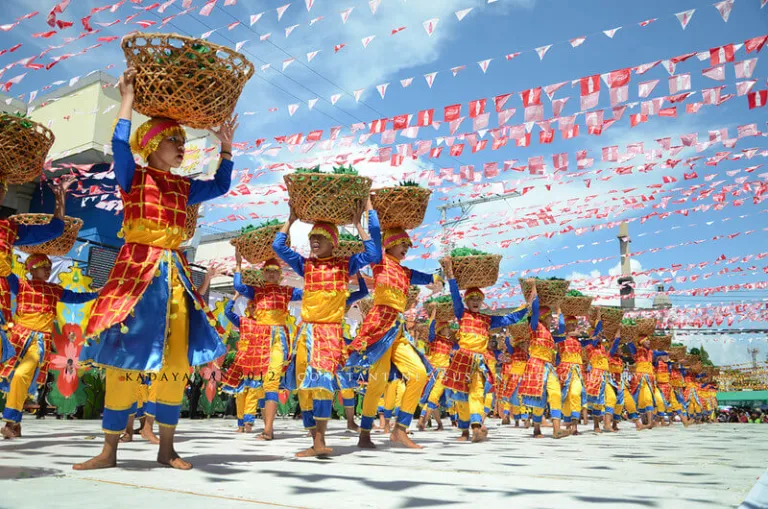
Among the must-see festivals in Mindanao is the Kadayawan Festival in Davao City, one of the most anticipated fiestas in the Philippines! Come the third week of August, Dabaweños show their respects to the lumad, a group of indigenous people in Davao. Embracing the multi-ethnic diversity of the city, the Kadayawan Festival showcases the traditions of 11 tribes: Ata, Bagobo-Klata, Bagobo-Tagabawa, Iranun, Kagan, Maguindanaon, Maranao, Matigsalug, Ovu Manobo, Sama, and Tausug.
From enjoying the cultural performances at Dula Kadayawan to witnessing the festive dancing on the street at Indak-Indak sa Kadalanan, this Philippine fiesta celebrates life, nature’s harvest, and unity across different cultures. And while you’re here, you can’t leave without trying durian!
When: Third week of August
September
12. Peñafrancia Festival in Naga, Camarines Sur
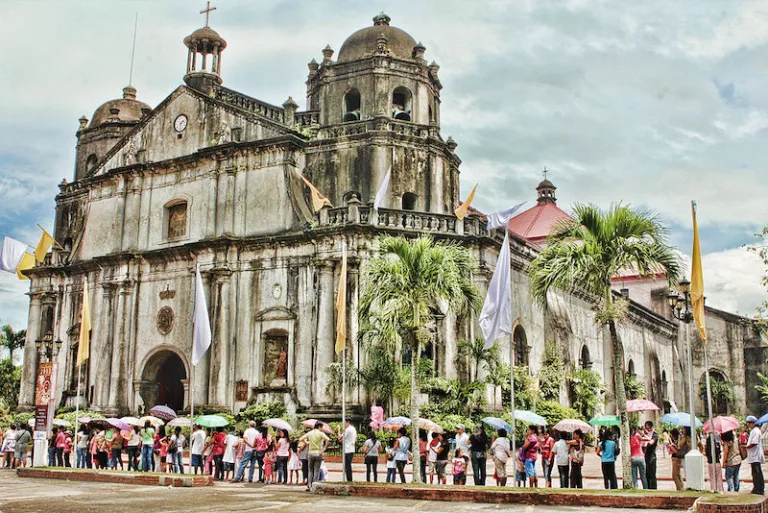
One of the oldest religious festivals in the Philippines is the Peñafrancia Festival, which takes place in Naga City, Camarines Sur in the Bicol Region. For more than 300 years, thousands of religious devotees have flocked to Naga in honour of Bicol’s patron saint, Our Lady of Peñafrancia.
What follows is a celebration of two feasts: the Divino Rostro (Holy Face of Jesus) on the second Friday of September and the fluvial procession for Our Lady of Peñafrancia on the third Sunday of September. Thanks to the popularity of the festival, Naga has been referred to as the “pilgrim city” of the Philippines.
When: Third Sunday of September
October
13. MassKara Festival in Bacolod, Negros Occidental
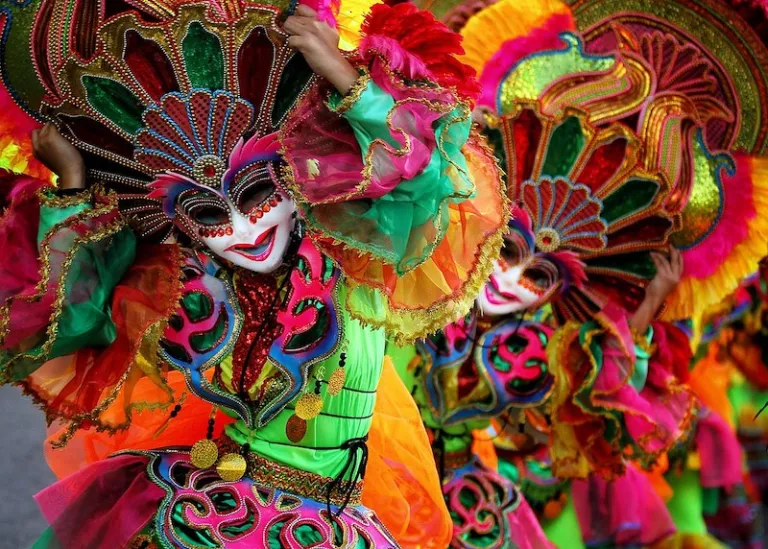
Carnivals, fairs, and masked street dancers fill the streets with laughter and endless excitement at the Masskara Festival in Bacolod City. Compared to religious festivals in the Philippines, which pay tribute to saints in the Catholic faith, the Masskara Festival doesn’t have any spiritual origins. Rather, it was borne out of tragic events in the province of Negros Occidental, namely the sugarcane crisis and the sinking of the MV Don Juan in 1980. To shore up morale, the local government introduced the MassKara Festival.
MassKara is a combination of “mass,” referring to a big gathering of people, and “cara,” the Spanish word for “face.” Thus, you have the iconic smiling masks — a fitting symbol for the City of Smiles!
When: Fourth Sunday of October
November
14. Higantes Festival in Angono, Rizal
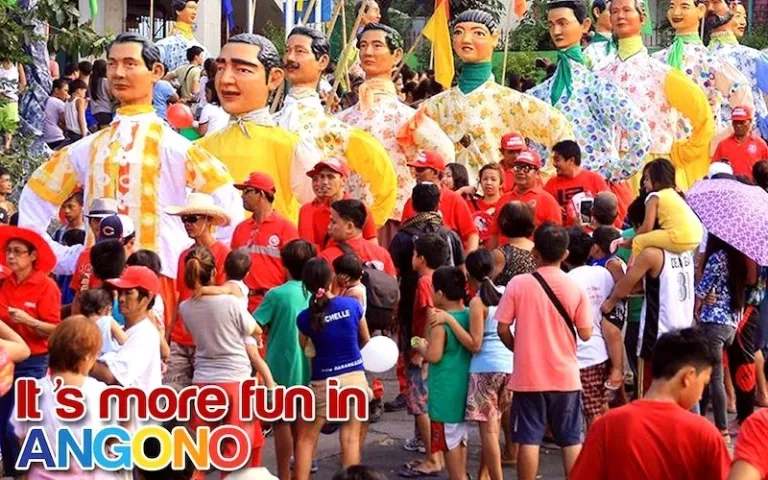
Known as the hometown of national artists like Botong Francisco and Lucio San Pedro, Angono takes pride in its artistic heritage and the talent of its community — a creative passion that rises to the occasion during the Higantes Festival. Every November, the townsfolk parade hundreds of giant puppets on the street, simultaneously celebrated with Saint Clement’s feast day.
During Spanish colonial rule in Angono, the Spaniards banned celebrations and permitted only one festival each year. Turning this rule on its head, the townsfolk used papier-mâché — an art method brought by the Spaniards — to make giant caricatures in their likeness, poking fun at these landowners. What began as a clever symbol of protest is now a major festival in the Philippines. Additionally, this fiesta incorporates local myths and folklore, producing giants that can measure up to 12 feet high to smaller giants known as higantitos.
When: 22 Nov to 23 Nov
December
15. Giant Lantern Festival in Pampanga
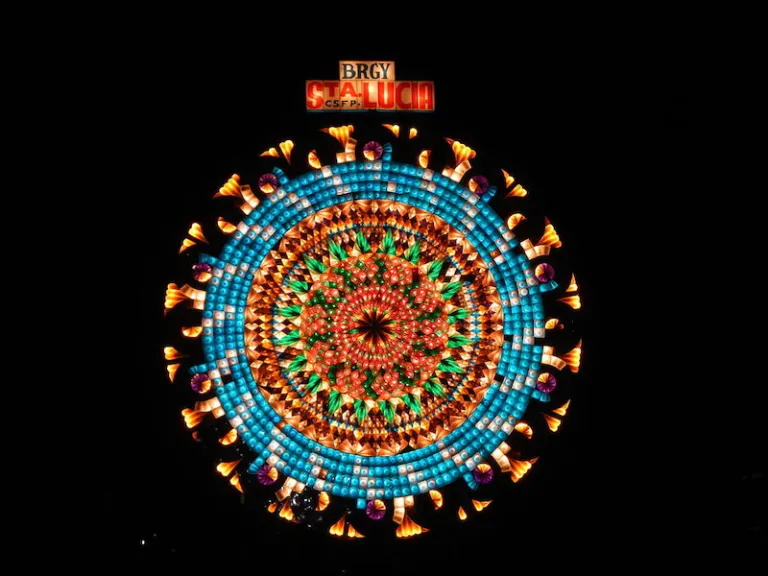
Nowhere else will you find a more festive way to celebrate Christmas than in San Fernando, the birthplace and site of the annual Giant Lantern Festival. Held in mid-December, this Filipino festival showcases a competition of Christmas lanterns and paroles with vibrant patterns. This way, they promote a cheery message of hope and light.
Owing to this Filipino festival’s popularity, San Fernando has been dubbed the “Christmas Capital of the Philippines.” Considering the preparations for Christmas in the Philippines can begin as early as the -Ber months, stringing festive lights and blasting Jose Marie Chan in every mall, we’d consider that quite the achievement!
Also read: 10 Best Festivals in the Philippines
More than occasions to party and feast on mouth-watering food until the sun goes down, these festivals and fiestas in the Philippines are symbols of resilience, diversity, and community. Certainly, it’s this open generosity and hospitality that earns us the tagline: “It’s more fun in the Philippines!”
That said, which of these festivals in the Philippines do you look forward to visiting most? We’d love to hear from you! Let us know on our official Facebook and Instagram pages!
Published at
About Author
Tiffany Conde
Subscribe our Newsletter
Get our weekly tips and travel news!
Recommended Articles
10 Bantayan Island Resorts, Hotels, and Rentals for Your Tropical Escape 14 Best Credit Cards for Travel in the Philippines The only plastic we need for travel.
10 Best Mountain Cafes in the Philippines for Your Peak Coffee Experience Coffee date on the mountains, anyone?
10 Fairytale Castles In Europe Filipinos Need To See! Permission to feel like royalty even for a day?!
10 Family Outing Ideas in Metro Manila Under ₱500 Looking for a weekend bonding with the family under ₱500? Head to these places, pronto!
Latest Articles
8 Stunning Beaches in Batangas for Your Perfect Getaway Just a few hours away from Manila!
Philippine Airlines to Suspend Manila-Kalibo Flights Time to recheck your route.
What to Do During Car-Free Sundays at Ayala Gear up for a fun Sunday—with no cars!
Seoul, South Korea is Crowned as the World's Best Solo Travel Destination Time for some Seoul searching.
Philippines Ranks 75th in 2025 Henley Passport Index We're down two places from last year.
